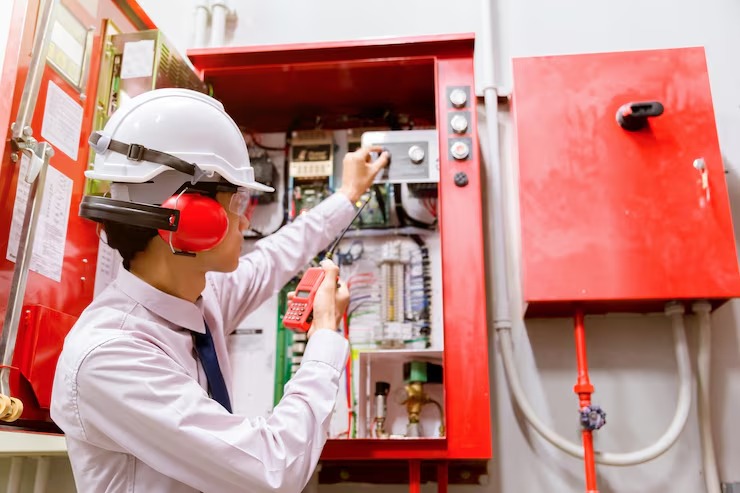Fire safety is one of the most important requirements for residential, commercial, and industrial buildings. Dubai places strong emphasis on protecting lives and property through well-regulated safety systems. Fire alarm system installation is a core part of these safety measures, ensuring that people are alerted quickly in case of a fire. Understanding how these systems work and how they are installed in Dubai helps building owners, managers, and residents stay compliant and safe.
Importance of Fire Alarm Systems in Dubai
Protecting Lives and Property
The primary role of a fire alarm system is to warn people about a fire at the earliest stage. This early alert gives enough time for evacuation and reduces injuries and fatalities. Property damage is also minimized when emergency response is activated on time.
Compliance with Regulations
Dubai follows strict fire safety codes set by the Dubai Civil Defence. All buildings, whether residential towers, offices, or warehouses, must follow these codes. Fire alarm system installation ensures compliance with these laws and prevents legal issues.
Enhancing Emergency Preparedness
A reliable fire alarm system improves overall emergency readiness. When combined with evacuation plans and fire drills, it ensures that everyone in the building knows how to react during an emergency.
Types of Fire Alarm Systems
Conventional Fire Alarm Systems
Conventional systems divide a building into different zones. If a detector senses smoke or heat, the control panel shows which zone is affected. This type is suitable for small to medium-sized buildings.
Addressable Fire Alarm Systems
Addressable systems assign a unique address to every device, such as detectors and call points. This allows the system to pinpoint the exact location of the fire. They are ideal for larger and more complex buildings in Dubai.
Wireless Fire Alarm Systems
Wireless systems use radio signals instead of cables. These systems are useful in places where wiring is difficult or where the building design must remain untouched. They are becoming more popular in modern Dubai construction projects.
Aspirating Smoke Detection Systems
These advanced systems continuously sample air through pipes to detect smoke at the earliest stage. They are often used in high-value areas such as data centers, museums, or luxury properties.
Steps in Fire Alarm System Installation
Planning and Risk Assessment
Before installation, a detailed fire risk assessment is carried out. This identifies hazards, building layout, and areas requiring coverage. Engineers use this information to design the most effective system.
Designing the Fire Alarm System
The system design is created according to Dubai Civil Defence codes. Factors like building size, occupancy, escape routes, and type of property are considered. The design stage ensures that all detectors and alarms are placed strategically.
Installation of Devices
Technicians install detectors, manual call points, control panels, sounders, and visual alarms. Each device is tested during installation to ensure proper functioning. The wiring or wireless connections are checked to avoid faults.
Integration with Other Safety Systems
In Dubai, fire alarms are often linked with sprinklers, smoke control systems, and emergency lighting. This integration creates a complete safety network that responds automatically in case of fire.
Testing and Commissioning
After installation, the system is tested thoroughly. The fire alarm panel, detectors, and notification devices are checked under different scenarios. The final commissioning report is prepared for approval.
Handover and Training
Building owners and staff receive training on how to operate the system. They learn how to recognize faults, reset alarms, and conduct regular testing. Proper training ensures long-term effectiveness.
Regulatory Requirements in Dubai
Dubai Civil Defence Approval
All fire alarm system installation projects must be approved by Dubai Civil Defence. Without approval, a building cannot receive completion or occupancy certificates.
Standard Compliance
The systems must follow international standards like NFPA (National Fire Protection Association) along with local UAE Fire and Life Safety Codes.
Periodic Inspections
Dubai Civil Defence requires periodic inspections of installed systems. Building owners must maintain their systems in working condition and provide inspection records when requested.
Common Components of Fire Alarm Systems
Fire Alarm Control Panel
The control panel is the brain of the system. It receives signals from detectors and activates alarms.
Smoke and Heat Detectors
Smoke detectors sense smoke particles while heat detectors respond to rising temperature. Both are essential for timely detection.
Manual Call Points
Manual call points allow occupants to trigger the alarm manually by pressing a button or breaking glass.
Alarm Sounders and Flashing Lights
These devices alert people through loud sounds and visual signals. They are critical in noisy areas and for people with hearing impairments.
Power Supply
Fire alarm systems require backup power sources. Battery backups or generators ensure the system works even during power outages.
Benefits of Proper Fire Alarm System Installation
Early Detection and Response
Quick detection reduces fire spread and makes evacuation safer.
Reduced Insurance Costs
Buildings with proper fire alarm systems often enjoy lower insurance premiums, as insurers consider them less risky.
Increased Property Value
Modern buildings in Dubai with advanced fire safety systems attract more buyers and tenants. Safety features add value to real estate investments.
Peace of Mind
Occupants feel secure knowing that reliable safety systems are in place. This psychological comfort improves quality of life and productivity.
Challenges in Fire Alarm System Installation
Complex Building Designs
High-rise towers and large shopping malls in Dubai require advanced system designs. Covering every area can be challenging and expensive.
Maintenance and Testing
Fire alarms need regular maintenance. Neglecting system checks can result in failures during emergencies.
Cost Considerations
Advanced systems such as addressable or aspirating detectors can be costly. Budget planning is important for large-scale projects.
Maintenance of Fire Alarm Systems in Dubai
Routine Testing
Weekly or monthly tests ensure that alarms and detectors work properly.
Annual Servicing
Technicians perform complete servicing once a year. This includes cleaning detectors, checking batteries, and recalibrating sensors.
Record Keeping
All maintenance and inspection records must be kept for legal compliance. Dubai Civil Defence may request these records anytime.
Upgrades and Replacements
As technology evolves, older systems may need upgrades. Replacing outdated systems with modern solutions ensures continued safety and compliance.
Future Trends in Fire Alarm Systems in Dubai
Smart Fire Alarm Systems
IoT-based fire alarms connect with mobile apps and building management systems. They allow real-time monitoring and faster emergency response.
AI-Powered Detection
Artificial intelligence helps detect false alarms and improves accuracy. These systems learn building patterns to provide smarter alerts.
Integration with Smart Buildings
As Dubai invests in smart cities, fire alarms are becoming part of integrated building management platforms. This provides centralized control of safety systems.
Eco-Friendly Systems
Manufacturers are developing environmentally friendly systems with low energy consumption and sustainable materials.
Conclusion
Fire alarm system installation in Dubai is a vital process that ensures safety, compliance, and peace of mind. From planning and design to installation and maintenance, every step must meet the standards of Dubai Civil Defence. A reliable system not only protects lives but also secures property and business continuity. With advancing technology, fire alarm systems in Dubai are becoming smarter, faster, and more effective. Building owners, managers, and residents must prioritize installation and maintenance to ensure that they are always ready for emergencies.





